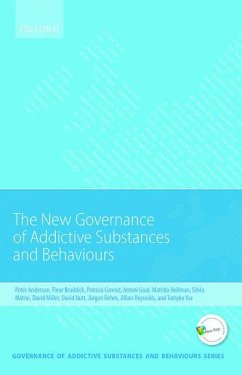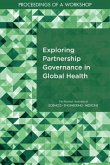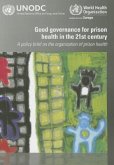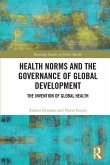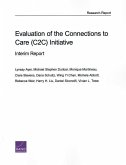Peter Anderson, Jillian Reynolds, Tamyko Ysa, Fleur Braddick, Patricia J Conrod, Antoni Gual, Matilda Hellman, Silvia Matrai, David Miller, David Nutt, Jurgen Rehm
New Governance of Addictive Substances and Behaviours
Peter Anderson, Jillian Reynolds, Tamyko Ysa, Fleur Braddick, Patricia J Conrod, Antoni Gual, Matilda Hellman, Silvia Matrai, David Miller, David Nutt, Jurgen Rehm
New Governance of Addictive Substances and Behaviours
- Broschiertes Buch
- Merkliste
- Auf die Merkliste
- Bewerten Bewerten
- Teilen
- Produkt teilen
- Produkterinnerung
- Produkterinnerung
Presenting the findings of a five year project studying the pace and impact of addictions in Europe, this book deconstructs the failures and promises of European governance polices for reducing the harm done by legal and illegal drugs and posits a nine point plan as a way forward to redesign addictions governance.
Andere Kunden interessierten sich auch für
![Exploring Partnership Governance in Global Health Exploring Partnership Governance in Global Health]() National Academies of Sciences Engineering and MedicineExploring Partnership Governance in Global Health62,99 €
National Academies of Sciences Engineering and MedicineExploring Partnership Governance in Global Health62,99 €![Good Governance for Prison Health in the 21st Century Good Governance for Prison Health in the 21st Century]() Centers of Disease ControlGood Governance for Prison Health in the 21st Century35,99 €
Centers of Disease ControlGood Governance for Prison Health in the 21st Century35,99 €![Health Norms and the Governance of Global Development Health Norms and the Governance of Global Development]() Anders GranmoHealth Norms and the Governance of Global Development64,99 €
Anders GranmoHealth Norms and the Governance of Global Development64,99 €![Global Health Governance and Policy Global Health Governance and Policy]() Eduardo MissoniGlobal Health Governance and Policy63,99 €
Eduardo MissoniGlobal Health Governance and Policy63,99 €![Evaluation of the Connections to Care (C2C) Initiative Evaluation of the Connections to Care (C2C) Initiative]() Lynsay AyerEvaluation of the Connections to Care (C2C) Initiative42,99 €
Lynsay AyerEvaluation of the Connections to Care (C2C) Initiative42,99 €![Getting to Grips with Clinical Governance Getting to Grips with Clinical Governance]() Simon Cw HarrisonGetting to Grips with Clinical Governance41,99 €
Simon Cw HarrisonGetting to Grips with Clinical Governance41,99 €![It Governance in Hospitals and Health Systems It Governance in Hospitals and Health Systems]() Roger KropfIt Governance in Hospitals and Health Systems108,99 €
Roger KropfIt Governance in Hospitals and Health Systems108,99 €-
Presenting the findings of a five year project studying the pace and impact of addictions in Europe, this book deconstructs the failures and promises of European governance polices for reducing the harm done by legal and illegal drugs and posits a nine point plan as a way forward to redesign addictions governance.
Hinweis: Dieser Artikel kann nur an eine deutsche Lieferadresse ausgeliefert werden.
Hinweis: Dieser Artikel kann nur an eine deutsche Lieferadresse ausgeliefert werden.
Produktdetails
- Produktdetails
- Verlag: Oxford University Press, USA
- Seitenzahl: 252
- Erscheinungstermin: 9. April 2017
- Englisch
- Abmessung: 232mm x 155mm x 16mm
- Gewicht: 386g
- ISBN-13: 9780198759836
- ISBN-10: 0198759835
- Artikelnr.: 47870154
- Herstellerkennzeichnung
- Libri GmbH
- Europaallee 1
- 36244 Bad Hersfeld
- gpsr@libri.de
- Verlag: Oxford University Press, USA
- Seitenzahl: 252
- Erscheinungstermin: 9. April 2017
- Englisch
- Abmessung: 232mm x 155mm x 16mm
- Gewicht: 386g
- ISBN-13: 9780198759836
- ISBN-10: 0198759835
- Artikelnr.: 47870154
- Herstellerkennzeichnung
- Libri GmbH
- Europaallee 1
- 36244 Bad Hersfeld
- gpsr@libri.de
Peter Anderson is trained as a general practitioner and a specialist in public health medicine at Oxford University and the London School of Hygiene and Tropical Medicine. He is a member of the World Economic Forum's Global Agenda Council on Health and Well-being. From 1992 to 2000, he worked as the regional advisor for both tobacco and alcohol with the European Office of the World Health Organization and directed the Department of Health Promotion and Disease Prevention. He has brought science to policy across a range of public health issues for several governments, intergovernmental organizations and public and private sector think tanks around the world. He has over 150 publications in international peer reviewed journals, is the author or editor of some 15 books and has published 12 monographs on addictions for the European Commission and the World Health Organization. Fleur Braddick is a Human Scientist (biological and social sciences) and Medical Anthropologist by training and has worked in primary research and public health institutions in the areas of developmental psychology, psychopharmacology, mental health and substance use. She currently works as the Science Communication Officer of large international projects (such as ALICE RAP and LEADER) and as a technical consultant at the Catalan Department of Health on regional-level mental health promotion and disorder prevention programmes in different settings. She has a keen interest in the ethics of public health policy, regulation and intervention and implementation. Patricia Conrod is a Registered Clinical Psychologist with the Ordre des Psychologues du Québec, Full Professor in Psychiatry, Université de Montréal and Senior Visiting Lecturer in the Addictions Department, King's College London. She is based at the CHU Sainte-Justine Mother and Child Hospital Centre in Montreal and previously a Senior Clinical Lecturer in Addictions at King's College London. Her research focuses on cognitive, personality and biological risk factors for the development and maintenance of drug abuse and the factors that mediate the co-occurrence of addictive behaviours with other mental disorders. Her experimental research focuses on factors that make people more susceptible to seek out behavioral reinforcement from drugs of abuse. Her research findings have led to the development of new approaches to substance abuse treatment and prevention that target personality risk factors and the underlying motivational determinants of drug use in subtypes of substance misusers. Antoni Gual is a psychiatrist, with long experience in Addictions research, including both the clinical and the public health fields. He is head of the Addictions Unit at the Clinic Hospital of Barcelona, Spain; and also acts as Alcohol Consultant at the Health Department of Catalonia. He is coordinator of the ALICE RAP project (www.alicerap.eu) and is involved in several European research projects in the areas of Public Health and clinical trials. He is Vice-President of the International Network on Brief Interventions for Alcohol Problems (INEBRIA), President of the European Federation of Addiction Scientific Societies (EUFAS) and past president of the Spanish Scientific Society for the Study of Alcohol and Alcoholism. Matilda Hellman is an internationally recognized researcher of understandings of and societal reactions to transgressive and excessive problematic behaviour. Hellman has published extensively and held the lead in a series of international research projects since 2005. Hellman is vice director of the University of Helsinki Centre for Research on Addiction, Control and Governance (CEACG), and holds a university lectureship in sociology at the University of Tampere. Hellman has served as editor for several books and scientific journals. She is currently the vice president of the Kettil Bruun Society for Social and Epidemiological Research on Alcohol. She works as a consultant for the Finnish National Institute for Welfare and Health (THL). Silvia Matrai is a trained psychologist and cognitive-behavioural therapist (MSc), specialised in psychodiagnostics (MSc) and health care management (MSc) including health economics and public health policies. She has worked in clinical practice specialising in mental health in medical patients, psychosocial support at high-stress workplaces, and therapeutic communities and individual psychotherapy in addictions. She has been involved in clinical trials, public health research in addictions, and as a researcher and international project manager in large-scale collaborative interdisciplinary research projects. David Miller is Professor of Sociology at the University of Bath. He is interested in the effects of corporate and state power on policy and society more generally. He conducts research on lobbying, think tanks, policy planning groups, how they are funded and with what effect. His interest in addictions focuses on how corporate interests attempt to manage the harms that their products cause. David Nutt is a psychiatrist at Imperial College London. He trained at Cambridge, Guys Hospital, Oxford University and NIH. His research focuses on the use of PET and fMRI imaging to understand how drugs work in the brain and the mechanism underpinning psychiatric disorders, particularly addiction and anxiety disorders. Jürgen Rehm, Ph.D., holds positions at the CAMH (Toronto, Canada) as Director of the Social and Epidemiological Research Department and Head of the PAHO WHO Collaborating Centre. In addition, he has been appointed the Inaugural Chair for Addiction Policy at the Dalla Lana School of Public Health of the University of Toronto, and section head for epidemiology at the Institute for Clinical Psychology and Psychotherapy of the Technical University Dresden (Germany). Dr. Rehm has published more than 700 peer-reviewed journal articles in addiction research; he is listed among the ISI/Thompson Reuters globally most highly cited in the fields of social research and epidemiology (top 1% with respect to impact as measured by citations) and has been awarded the Jellinek Award, the most prestigious award worldwide for alcohol research. He has served as consultant to many countries, and is member of the WHO Expert Advisory Panel of on Drug Dependence and Alcohol Problems. Jillian Reynolds is a political scientist, holding a masters' degree in social and public policy from the Universitat Pompeu Fabra- The Johns Hopkins University. She has worked as a social and public policy researcher both in the public and private sectors, participating in projects focused on the core welfare policy areas: health and social protection, education, training and employment. She currently works as the Science Officer and researcher of the European-wide interdisciplinary projects coordinated by the Addictions Unit of Hospital Clínic of Barcelona (such as ALICE RAP, AMPHORA or ODHIN), and has particular interest in the reduction of social and health inequalities through public health initiatives. Dr. Tamyko Ysa, PhD in Political Science, Executive Master in Public Management, MSc in Public Administration and Public Policies (LSE), BA in Political Science, BA in Law. Associate Professor of the Department of Strategy and General Management and of the Institute for Public Governance and Management, and Vice-Dean for Research at ESADE Business School. She has published in journals such as "Journal of Public Administration Research and Theory", "International Public Management Journal", "Journal of Business Ethics" or "Public Money & Management". Her previous books and chapters include "Governments and Corporate Social Responsibility: Public Policies beyond Regulation and Voluntary Compliance", "New Steering Concepts in Public Management" and "Governance of Addictions: European Public Policies".
* 1: Key elements for a New Governance of Addictive substances and
behaviours
* 2: New concepts of addiction
* 3: The ethical basis for preventing harm from heavy use of addictive
products
* 4: Drivers of the harm done by drugs
* 5: Approaches to reducing the harm done by addictive substances and
behaviours should be comprehensive and address the whole population
* 6: Policies and measures that impact on the harm done by addictive
substances
* 7: Empowering young people to manage drug-related risk
* 8: Government leadership for whole-of-society approaches
* 9: Private sector impact on the harm done by addictive substances
* 10: Civil society approaches to reducing the harm done by addictive
substances
* 11: Conclusions
* Index
behaviours
* 2: New concepts of addiction
* 3: The ethical basis for preventing harm from heavy use of addictive
products
* 4: Drivers of the harm done by drugs
* 5: Approaches to reducing the harm done by addictive substances and
behaviours should be comprehensive and address the whole population
* 6: Policies and measures that impact on the harm done by addictive
substances
* 7: Empowering young people to manage drug-related risk
* 8: Government leadership for whole-of-society approaches
* 9: Private sector impact on the harm done by addictive substances
* 10: Civil society approaches to reducing the harm done by addictive
substances
* 11: Conclusions
* Index
* 1: Key elements for a New Governance of Addictive substances and
behaviours
* 2: New concepts of addiction
* 3: The ethical basis for preventing harm from heavy use of addictive
products
* 4: Drivers of the harm done by drugs
* 5: Approaches to reducing the harm done by addictive substances and
behaviours should be comprehensive and address the whole population
* 6: Policies and measures that impact on the harm done by addictive
substances
* 7: Empowering young people to manage drug-related risk
* 8: Government leadership for whole-of-society approaches
* 9: Private sector impact on the harm done by addictive substances
* 10: Civil society approaches to reducing the harm done by addictive
substances
* 11: Conclusions
* Index
behaviours
* 2: New concepts of addiction
* 3: The ethical basis for preventing harm from heavy use of addictive
products
* 4: Drivers of the harm done by drugs
* 5: Approaches to reducing the harm done by addictive substances and
behaviours should be comprehensive and address the whole population
* 6: Policies and measures that impact on the harm done by addictive
substances
* 7: Empowering young people to manage drug-related risk
* 8: Government leadership for whole-of-society approaches
* 9: Private sector impact on the harm done by addictive substances
* 10: Civil society approaches to reducing the harm done by addictive
substances
* 11: Conclusions
* Index

